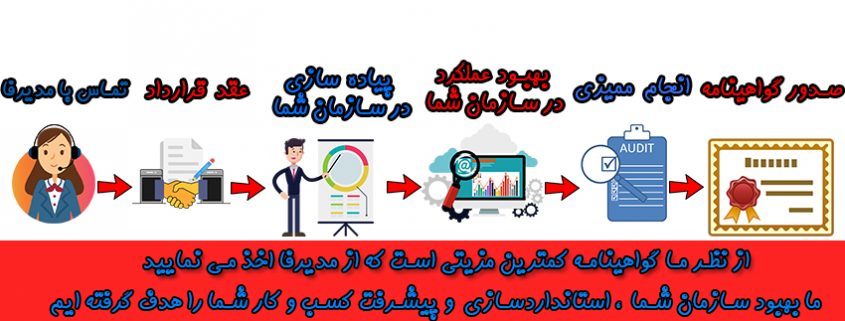
If you need advice on the implementation of the ISO22000:2018 standard, contact our experts at Modirfa.
02188764867 – 02188761795

FSSC 22000 standard
FSSC 22000 Advice on obtaining standards (Food Safety System Certification) consulting is a strategic step after ISO22000 certification for those seeking Global Food Safety Initiative (GFSI) certification.
FSSC 22000 and the ISO22000 standard are related to each other because they both focus on food safety in the same company.
The FSSC 22000 scheme is recognized by the Global Food Safety Initiative (GSFI), the benchmark body for the harmonization of international food safety standards, along with other food safety management schemes such as the BRC IFS and SQF schemes.
FSSC 22000 certification is a food safety management certification scheme administered by the FSSC 22000 Foundation.
The latest version of FSSC 22000 (Version 5.1) was released in November 2020 by the FSSC22000 Foundation.
The difference between the FSSC 22000 standard and the ISO22000 standard
The FSSC 22000 standard includes additional requirements, including the Prerequisite Program (PRP), which provides specific controls for food plant operating conditions.
Both standards describe food management practices to ensure quality food products for consumers. Any organization in its food chain can obtain ISO 22000 certification, but FSSC 22000 certification is obtained by some industries. The process of getting FSSC 22000 certificate is longer.
The main difference between ISO 22000 and FSSC 22000 is that ISO 22000 is recognized by the International Organization for Standardization (ISO) and FSSC 22000 is recognized by the GFSI Food Safety Initiative.
The FSSC 22000 standard is composed of independent standards such as ISO22000, technical standards i.e. ISO 22000, PRP related specification/s (ISO/TS and BSI PAS standards), and additional FSSC requirements) and additional requirements.
The guidelines and implementation methods used to obtain the FSSC 22000 certification of the new edition are derived from the requirements of ISO 22000:2018, which, depending on the type of organizational activity, are combined with one of the following ISO technical standards:
ISO/TS 22002-1:2009 Food production system.
ISO/TS 22002-2:2003 Food safety in catering establishments.
ISO/TS 22002-3:2011 Safety in agricultural industries.
ISO/TS 22002-4:2013 Safety of food production and packaging.
ISO/TS 220002-6:2016 Safety system for the production of feed and animal feed.
PAS 221:2013 Retail or supermarkets.
NEN/NTA 8059:2016 Transportation and storage.
The FSSC 22000 standard guidelines also have some other additional requirements including the following:
Service management in FSSC 22000 standard
Product labeling as described in FSSC 22000 standard guidelines.
Food safety, food risk assessment
Reducing food fraud
Use of the logo
Allergen management of food chains categories C, E, FI, G, I and K
Environmental monitoring of food chain categories C, I and K
Formulation of D category food chain products
Shipping and delivery

FSSC 22000 standard certification body
The ISO 22000 standard certificate is issued by the ISO certification body, and the ISO 22000 standard was developed and published by the ISO International Organization for Standardization. The FSSC 22000 certificate was developed and published by the GFSI Food Safety Initiative. FSSC 22000 certification issuing body is the same as ISO issuing body, except that the issuing body must be approved by GFSI association.
The ISO 22000 standard is a food safety management system, which is one of the most common and widely used standards in the field of food.
ISO 22000 standard requirements are based on eliminating food safety risks as well as controlling HACCP critical points.
FSSC22000 standard certification validity check
To check the validity of the FSSC22000 certificate of your organization, go to the site
Visit www.fssc.com public-register section.
What organizations can obtain the FSSC 22000 certificate?
Food manufacturers
food packing
Food storage, distribution, transportation and logistics
Animal feed producers
Pet food manufacturers
Biochemical manufacturers
Benefits of implementing the FSSC 22000 standard
Ensuring that the product is completely safe and sound and manufactured and maintained in accordance with the most recognized standards
Expressing commitment to quality processes and continuous improvement
Strengthening the brand and access to top retailers
Minimize risk
reputation protection
Increase customer satisfaction
reduction in costs
Increase in profit
Improving processes and optimizing resources
Access to international markets
Ensuring the collective responsibility of all employees and thus implementing an effective self-control system
Building trust in the supply chain
Ensuring food production with prerequisite programs
Improving the quality of food
In general, the implementation of the FSSC 22000 standard leads to creating loyalty in customers and attracting new customers.
Also, since FSSC 22000 is the largest standard recognized by GFSI in the world, having this certificate leads to facilitating the presentation of products to other countries.
If you need FSSC22000 standard implementation advice, please contact our experts at Modirfa.
02188764867 – 02188761795
Beware of unlicensed and fraudulent organizations.
Be sure that if an organization gives you an ISO certificate without implementing it in your organization and conducting an audit, it must be a fraud.

